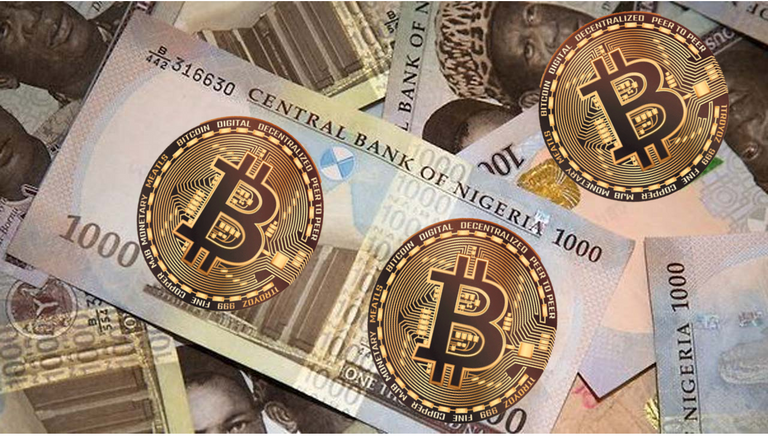
In this article, I discussed how to buy and sell Bitcoin and other cryptocurrencies directly with Naira from my years of experience. I hope this guide will be useful to Nigerians who may be experiencing some challenges in performing trades between crypto and Naira.
For a large section of the government and their lackeys in the population, cryptocurrencies are simply speculative assets that have not intrinsic value. For others like myself, it is a life changing opportunity that has enabled me to participate in something bigger than me.
In fact, the situation with Cryptocurrencies like Bitcoin got so bad that the government took things a bit further by banning financial institutions from transacting with them. This government-sponsored FUD turned out to shake out the weak hands in the market because this would cut off direct withdrawal and deposit of crypto to fiat and fiat to crypto respectively.
The policy has an adverse effect on crypto in the immediate impact, with naira being pulled out of exchanges fresh after the announcement. People were not willing to risk the potential of getting stuck on exchanges with no means of escape to handle day-to-day expenses in fiat.
The instantaneous effect was immense but just like in countries like China and India where crypto also faces restrictions, Nigerians also learned that these digital assets are inevitable. Peer-to-peer transactions that were used only sparingly took center stage. In the months since that decision by the Central bank, crypto traders have resorted to the use of peer-to-peer transactions for two-way transactions between bitcoin and fiat(Naira).
About P2P transactions
Peer-to-peer transactions or simply P2P as they are called, describes a trade, in this case, crypto trade, that is conducted between two parties in contact with each other. Unlike traditional trading on centralized exchanges where buyers and sellers are anonymous to each other, p2p transaction requires contact.
Despite being around for quite some time, p2p transactions haven't really been explored because of the underlying risk associated with it. We'll get to that point later on, but for now, let's talk about how the transaction is performed.
Pick a platform
In Nigeria, there are a number of p2p solutions available for trading cryptocurrency with Naira. The most popular of the lot is Binance. History has shown that Binance is the most commonly used exchange in Nigeria and it is also one of the easiest places to perform p2p transactions in Nigeria.
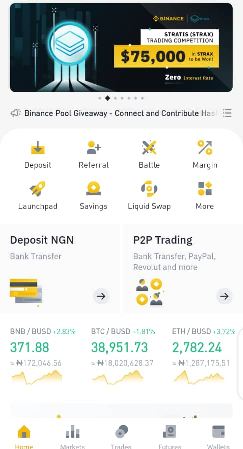
Other than Binance, there is also Huobi, @airhawk-exchange, and a few other local platforms that facilitate exchange between Bitcoin and Naira. In fact, since the policy made by the Central bank, many unregistered institutions sprung up to facilitate Bitcoin to Naira exchange.
However, for this article, I will be demonstrating the process through Binance because it is a registered and well-known crypto exchange.
Switch to P2P
You will need to transfer funds into your P2P wallet. On the Binance exchange, there are different wallets for different types of trade. So if you're a spot trader, you will have funds in that wallet and you can easily transfer it to your P2P wallet by following this simple procedure in the screenshots below.
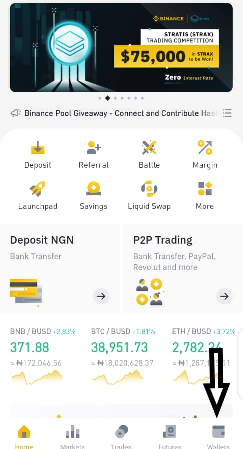
- Go to the wallet tab on the home page
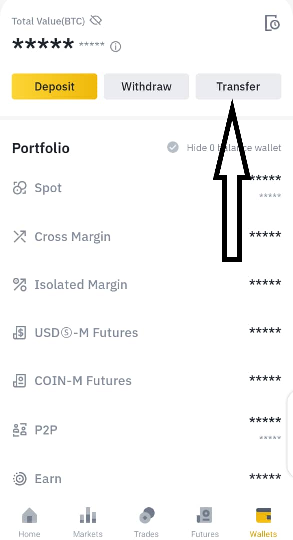
- Click on "Transfer" and the page below will popup
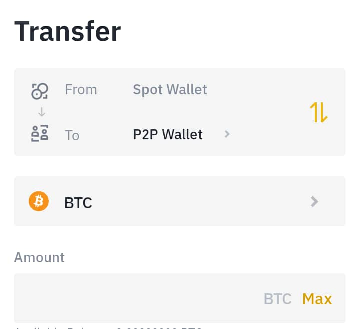
In this page, you can specify how much Bitcoin you want to move from your spot wallet to your P2P wallet. You can toggle between a variety of wallets to transfer funds from your spot wallet.
On Binance, the p2p portal is separate from the normal trading platform. In the finance mobile application, you can easily switch to the P2P portal by clicking on this tab in the screenshot below.
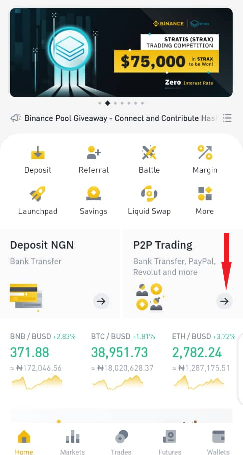
By simply clicking on that button on the homepage, you will switch to the P2P trading platform on Binance mobile application.
- Note: This tutorial is for the full Binance application and not Binance Lite.If you're on Binance lite, here's how to switch to the full Binance application;
- From the homepage, click on your profile emoji at the top left of your screen
- Deactivate lite mode by toggling the button
Set or pick your price
In a P2P transaction, much like any other exchange, there is a buyer and a seller. Just like traditional trading activities have makers and takers, so do p2p transactions.
One party often sets the price and the other party accepts the price. Also, depending on the context, either party could be a maker or a taker. In this example, I will be the market taker, since I haven't gotten approval to set my own price.
Here is a list of digital assets that you can perform P2P transactions with on Binance
- Bitcoin
- BUSD(Binance dollar)
- USDT
- Ethereum
- DAI
Pick your payment method
This is one part that a lot of people have found stressful to understand. I can't remember how many times I have been randomly contacted by people that tell me "how come Binance doesn't support my bank".
Here's the thing, it is not Binance but the specific trader you're contacting. Each trader specifies their preferred payment method. On Binance there are three types of payment methods used by traders and each trader uses at least one or more methods.
To identify the payment solution used by the trader, all you need is to use the filter on the right-hand side of your page.
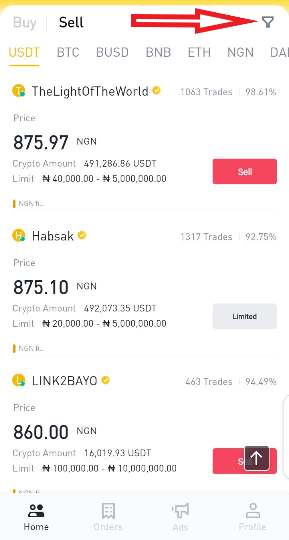
Here's a screenshot of some of the payment methods supported. Selecting the option will only show traders that use that method
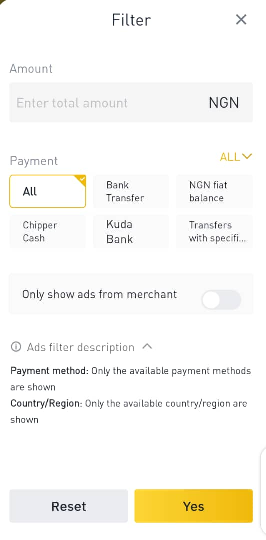
SO all you need to do is pick a payment method that suits you. Ideally, you should select bank transfer since you want to receive Naira for your Bitcoin.
Pay attention to volume
Finally, it is also important to look out for the volume that the trader is willing to accept. The traders at the top of the page often offer the best prices but often trade higher volumes.
At the lower end of the list, traders that require smaller volumes offer lower rates. The most important thing is to ensure you're doing it right and stay
Initiate trade
After going through all the previously mentioned steps, the last phase is to initiate the trade. In this phase, you specify how much Bitcoin you want to sell and then contact the buyer.
Immediately you contact the buyer by initiating the trade, your Bitcoin is held in escrow. When the buyer sends you money to your bank account, you confirm the payment through the app, and the Bitcoin moves to the buyer's wallet.
What are the risks?
Despite the simplicity of the transaction, P2P trade is a very risky approach for exchanging Bitcoin for Naira. I haven't had any bad experiences, but there have been numerous stories of people using the platform to scam traders.
One scheme is when a buyer falsely claims to have sent money to your bank account. The buyer achieves this by presenting a doctored bank statement to claim they sent funds to the victim. This Twitter thread explains the situation with an unfortunate case.
The most important thing you need to remember is that crypto trading is a risky business, so you have to trade with caution. Peer to Peer transactions on exchanges adds another layer of risk that requires you to be extra vigilant.
I recommend that you only use this approach if you absolutely need to exchange crypto for Naira. The alternative is to just send your Bitcoin to someone you trust and have them pay you the Naira to your bank account. Trust is hard to come by in this market, and you can't put a price on it.
Trade carefully and may the odds be in your favour.

Posted Using LeoFinance Beta
Nice read, will be useful when I move to Nigeria to live like a king.
Posted Using LeoFinance Beta
Lol. You really plan to do this?
💥💥DOUBLE Boom💥💥
More info why you see this.
Posted Using LeoFinance Beta
💥Boom💥
Thanks for visiting my blog 😁
An even more detailed perspective...sharing this for everyone that ever asks me
Posted Using LeoFinance Beta
I just need Naira...
Posted Using LeoFinance Beta
It's a shitcoin though
Posted Using LeoFinance Beta
As any fiat money in this world.
Posted Using LeoFinance Beta
This is a quality guide to buying and selling bitcoin directly with Naira.
Hopefully, those in Nigeria can use this walkthrough as a means of escaping the fiat system in the country and all of the associated problems that come with mistrust of your government.
Keep stacking that Bitcoin!
Posted Using LeoFinance Beta
Thanks Dane. We do what we can. Hopefully more people will use it.
Posted Using LeoFinance Beta
Very crucial info. Since the banning of crypto bank transactions in Nigeria I've gone through quite some inconveniences trying to exchange. Although right now I've quite developed my routine this post has given me a new option I wasn't using before 👍
Very educative and detailed tutorial. This will be great help in avoiding the traditional system. Thanks for sharing
Ok, this is very brilliant. I understand better
Posted Using LeoFinance Beta
What a detailed guide and it is going to be of great help to the crypto world
I don't know if you Nigerians are aware that you are the center of world attention for the war you are waging against the centralized world through the economy you generate with the BTC. From Venezuela where I live I have followed closely all the incidents coming from your country and the struggle of your people for the right to be economically autonomous.
Posted Using LeoFinance Beta
Thanks for this. I really appreciate that you have an interest in our story. How are things at your end?
If there is a country that looks a lot like Nigeria that is mine, however here in Venezuela they have not yet banned crypto transactions but mining is a process relentlessly pursued by law, so that anyone who engages in that if it is not part of the state teams risk going to jail and have their machines confiscated.
Posted Using LeoFinance Beta